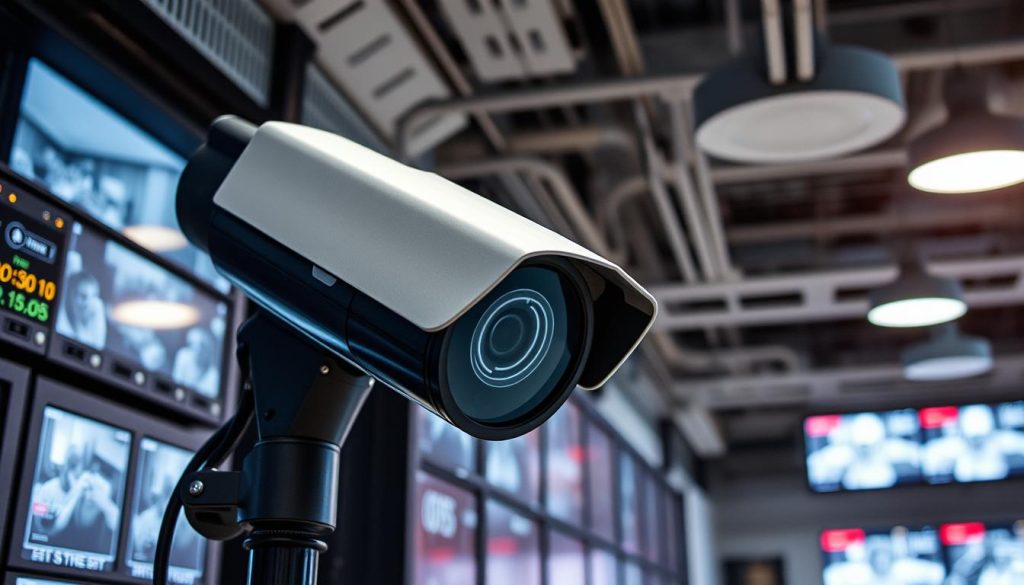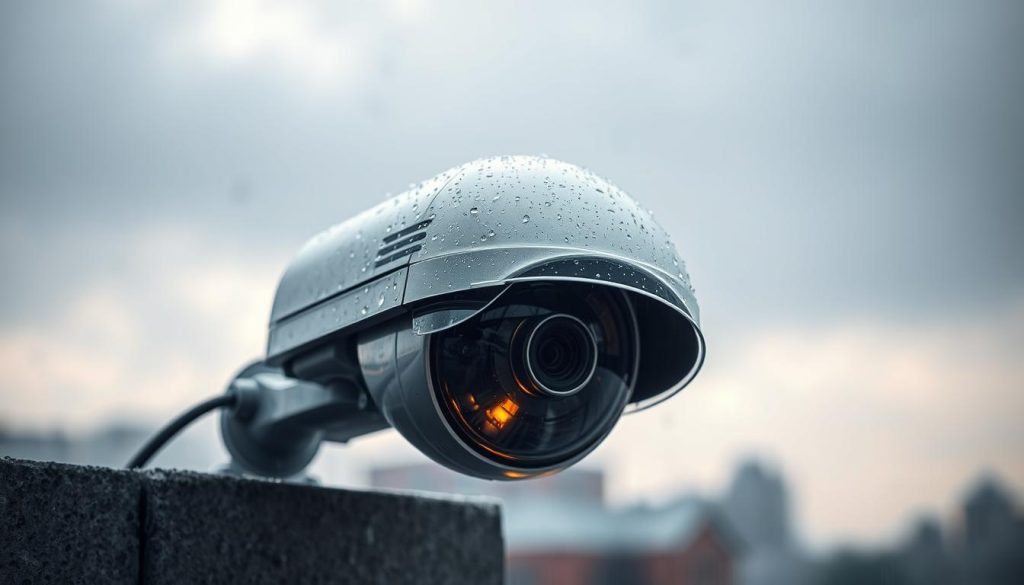In places like Singapore, where it rains a lot, it’s key to protect your CCTV camera from water. Water damage can really hurt how well your surveillance works and last. So, how do you keep your CCTV safe from rain? This article will show you smart ways to keep your cameras working well, even when it’s raining.
By using the right protection, you can make sure your cameras keep working. This means you can keep an eye on things, even when it’s wet outside. It’s a smart way to protect your investment and keep your surveillance clear.
Key Takeaways
- Proper CCTV camera rain protection is vital in areas prone to heavy rainfall.
- Utilizing waterproof CCTV solutions can enhance the durability of your surveillance systems.
- Effective installation techniques are essential to prevent water damage to CCTV cameras.
- Regular maintenance can help identify and mitigate potentially moisture issues.
- Advanced technology in cameras can enhance resistance against environmental elements.
Understanding Water Damage to CCTV Cameras
Water damage can really hurt the work and life of CCTV cameras. It’s key to know the different types of water damage to keep them working well. Each type of water can affect cameras in different ways, shortening their life if not fixed fast.
Common Types of Water Damage
Knowing the common water damage types helps us see the dangers. Here are the main ones:
- Immersion Damage: Happens when a camera gets fully wet, often from flooding.
- Condensation Damage: This is when water vapor inside the camera causes corrosion and foggy lenses.
- Surface Damage: Caused by rain or splashes that can harm the camera’s outer seals and parts.
Impact on Performance and Lifespan
Moisture can make CCTV cameras work less well and last less long. Cameras might show poor images, not work right, and even stop working if water gets in. It’s important to watch them closely and protect them well to keep them working right. This helps protect property and important info at key times.
Why CCTV Cameras are Vulnerable to Water
CCTV cameras face big challenges from water, mainly in places like Singapore. Many environmental factors cause these problems. They lead to issues with how well cameras work and can even damage them.
Environmental Factors in Singapore
Singapore’s weather is tough for CCTV systems. Heavy rain is a big problem for non-waterproof cameras. Rain can get inside, making them stop working.
The humidity in Singapore also causes trouble. Moisture inside cameras can lead to corrosion. This can really hurt how well cameras work.
Challenges with Non-Waterproof Cameras
Many cameras can’t handle Singapore’s weather. Non-waterproof cameras are very vulnerable to water damage. Without protection, they can lose their function and even break down faster.
It’s important for owners to think about these risks. They should choose and install CCTV systems carefully. This ensures they work well in different weather conditions.
How do I stop my CCTV camera from raining?
To keep your CCTV cameras dry, you can try a few things. First, make sure they’re not right in the rain’s path. It’s best to mount them under eaves or in a covered area. This way, they’re less likely to get wet.
Using waterproof boxes for your cameras is another smart move. These boxes keep moisture out while letting your cameras work well.
Also, make sure the area around your cameras has good air flow. This helps prevent moisture buildup. By doing this, you can keep your surveillance system working well, rain or shine.
Best Practices for Installing CCTV Cameras
Installing CCTV cameras right is key, more so in rainy areas. Following the best practices ensures your cameras work well, even in bad weather. It’s all about the right positioning and using shelters.
Optimal Positioning for Rain Protection
Don’t point CCTV cameras straight into the rain. Instead, angle them so raindrops slide off. This keeps the lens clear and images sharp, even when it’s raining.
Using Eaves and Shelters
Building eaves offer natural rain protection. They act as a shield, keeping cameras dry. You can also use canopies or custom shelters to keep water away. This helps your cameras last longer.
Investing in Waterproof CCTV Solutions
Choosing the right waterproof CCTV cameras is key for reliable surveillance, mainly in rainy areas. Investing in waterproof solutions is vital. It greatly lowers the chance of water damage that can harm camera function.
Choosing High IP Rated Cameras
When picking waterproof CCTV cameras, focus on the Ingress Protection (IP) rating. High IP-rated cameras are better at fighting moisture and dust. Look for IP66 or higher ratings to ensure your cameras can handle bad weather and stay working.
Recommended Brands and Models
Many top CCTV brands are known for their waterproof solutions. Hikvision, Reolink, and i-PRO are leaders in the field. They offer models with the latest image processing tech, giving you clear footage in any weather. Choosing these brands means you get durable, high-performance cameras with great support.
Using Protective Equipment for CCTV Cameras
Protective equipment is key to keeping CCTV cameras working in bad weather. Using the right devices and accessories can lower water damage risks. The right choices help cameras stay functional and capture clear images, even in heavy rain.
Waterproof Boxes and Housings
Waterproof camera housings are a strong defense against moisture. They fit snugly around CCTV cameras, protecting sensitive parts. These boxes keep rain out, making them vital for outdoor use.
Rain Covers and Accessories
Rain covers and other accessories also offer protection. They direct water away from the cameras, keeping lenses and circuits safe. This equipment is vital for keeping surveillance steady in damp conditions.
Sealing Techniques to Prevent Moisture Intrusion
To keep your CCTV system working well, it’s key to use good sealing techniques. This stops moisture from getting in. Sealing also keeps your cameras safe from water damage and makes them work better. Using different ways to seal your cameras can really help protect them from the weather.
Effective Sealing Approaches
Choosing the right sealing methods for your CCTV can really help protect your gear. Here are some good ways to do it:
- Sealants: High-quality silicone sealants around camera mounts and cable entry points make a strong barrier against moisture.
- Regular Checks: It’s important to check the seals often for wear and tear. Replace any seals that are not good anymore to keep moisture out.
By taking these steps, you can keep your CCTV system in top shape. For more on how the weather affects your equipment, check out this article.
Preventative Maintenance for CCTV Systems
Keeping CCTV systems in top shape is key. Regular maintenance boosts their reliability and lifespan. It involves several steps to fight off environmental damage.
Regular Inspections and Adjustments
It’s vital to check cameras often. This helps spot problems early. Regular checks also uncover moisture and corrosion issues. Here’s how to keep your CCTV systems running smoothly:
- Do scheduled inspections every month to look for damage.
- Check settings and camera angles after bad weather to keep surveillance strong.
These steps are important for CCTV upkeep. They help protect your investment. The right adjustments can make your systems more reliable.
Fixing Water-Damaged CCTV Cameras
Knowing the signs of water damage is key to quick action. Spotting these signs helps you fix water-damaged CCTV systems. This ensures they work well in different conditions.
Identifying Signs of Water Damage
- Foggy lenses can block clear views and show moisture.
- Visible corrosion on metal parts means long-term water exposure.
- Unstable power might mean internal damage that needs quick fixing.
Steps for Cleaning and Repair
- Turn off the camera’s power to avoid electrical shock.
- Take out damaged parts and dry them well before using again.
- Use desiccants to soak up extra moisture, keeping repairs dry.
- Clean with soft cloths to avoid scratches.
Impact of Weather on Surveillance Quality
Weather can greatly affect how well CCTV systems work. Changes in temperature and humidity can cause big problems for surveillance cameras. These issues often lead to poor image quality due to moisture.
Fogging Lenses and Image Quality Deterioration
Fogging lenses are a big problem for CCTV cameras, mainly in humid places. When it gets cold fast, moisture in the air can make lenses fog up. This makes pictures unclear and can cause false alarms if important details are missed.
Long-term Effects of Exposure to Moisture
Being exposed to moisture for a long time can damage camera parts. This can cause pixel distortion and lower image quality. To avoid these problems, it’s important to keep cameras well-maintained and protected.
Additional Tips for Maintaining Clear CCTV Footage
To keep CCTV footage clear in humid or rainy weather, some strategies are key. These methods help cameras last longer and improve image quality.
Using Anti-Fog Treatments
Anti-fog solutions are a great way to fight fog. These sprays, applied to camera lenses, cut down condensation. This keeps the lenses clear, allowing for better visuals, even in bad weather.
Humidity Control Measures
It’s important to control humidity around cameras to avoid moisture buildup. A good method is to use silica gel packets in the camera housing. They absorb moisture, reducing condensation risks. Make sure to check and replace these packets often for the best results.
Utilizing Technology for Enhanced Protection
In the world of CCTV systems, new tech is key to better protection against the weather. Recent tech breakthroughs have led to more effective solutions for different weather conditions. Modern designs are both functional and strong, making sure surveillance systems work well, no matter what.
Modern Innovations in Weather-Resistant Cameras
Weather-resistant tech is getting more common in the market. Makers are now adding advanced camera features to make them last longer and work better. Some big changes include:
- Innovative Designs: Many cameras now have built-in anti-fogging tech, making them clearer in bad weather.
- Improved Sealing Mechanisms: New sealing tech keeps moisture out, making the gear last longer.
- Smart Sensors: Some cameras have smart sensors that adjust settings as the weather changes, keeping them working best.
Brands like Hikvision and Dahua are leading in these weather-resistant techs. Their products show the latest in CCTV protection tech. Getting these advancements means your security systems will be more reliable and last longer. Check out more about vandal-proof CCTV security solutions to boost your protection even more.

Engaging Professionals for CCTV Installations
Choosing a professional for CCTV installation brings many benefits. Experts know how to handle your space’s unique needs, like Singapore’s rainy weather. They pick the right cameras to avoid water damage, keeping your system working well.
Working with security system providers means you get quality work. They follow the latest standards and practices. This reduces the chance of mistakes that could harm your cameras. A good installation makes your equipment last longer and work better, giving you the surveillance you need.
In short, going for professional CCTV installation is a smart choice. It ensures your system is ready for Singapore’s weather, keeping your property safe.

